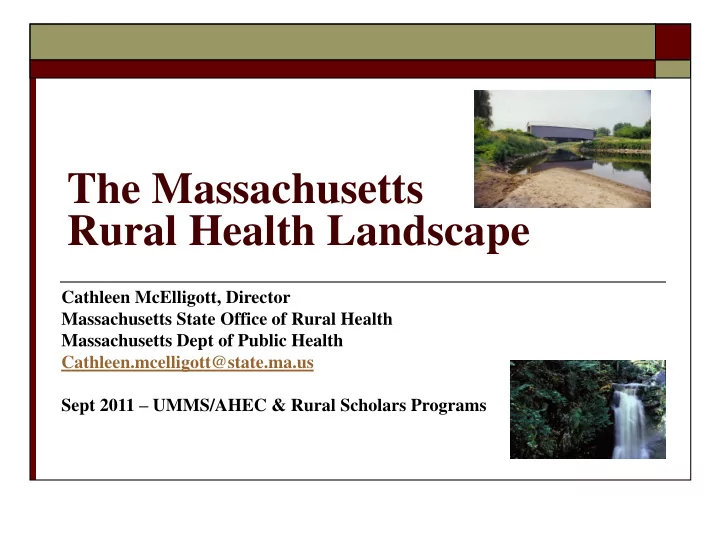

The Massachusetts Rural Health Landscape Cathleen McElligott, Director Massachusetts State Office of Rural Health Massachusetts Dept of Public Health Cathleen.mcelligott@state.ma.us Sept 2011 – UMMS/AHEC & Rural Scholars Programs
Rural Massachusetts Mass. often thought of as urban because dense concentration of people in metro Boston and eastern cities, BUT.... 713,968 people live in the 65% of state's landmass classified as rural (Census Bureau). Nearly half of MA towns are rural (46%) by a federal definition, primarily in western, central, and coastal southeast MA. Rural MA population density is only 109 people per square mile, comparable with other rural areas of the U.S. (density for urban MA= 2,115 ppsm)
Rural Healthcare Key Problems: Lower population density & greater distances Population smaller and spread out, program fixed costs can be higher per person served Lower volume, but with quality and accessibility Need supply of providers and allied/support staff that like the lifestyle and the wonderful community based, connected practice style In addition to access to care and good health outcomes – healthcare in rural MA is a HUGE economic engine
“When you see one rural area you have seen one rural area.” Some similar characteristic needs, challenges, and strengths as a group. But, always have to look at each rural area so you do not mask needs or challenges for particular rural parts of the state.
Geographic Barriers for Rural MA Such as: Mountains, hills, oceans, winding country roads, long distances, lack of public transportation Low population densities Patchwork quilt of small towns Lack of inexpensive and fast telecommunications, (broadband, high speed internet, cell phone) further isolate rural communities from more centralized or regionalized state programs.
Rural MA Socioeconomic Barriers Incomes lower Rely heavily on tourism, service, agricultural, and fishing economies Some rural towns are former small mill towns where the mill has closed or greatly downsized Higher proportion of self-employed, family workers, and small businesses; often do not provide health insurance Number of persons in rural areas with advanced education lower than the State average
Publicly Financed Care & Services With the economic demographic the rural population is more dependent on publicly-funded health services, as are the providers. Berkshire County, 50.5% of pregnant women have publicly financed prenatal care compared to 34.2% statewide. High proportion of elderly population; Medicare is payer of major importance.
Mass SORH Funding Federal Office of Rural Health Policy/HRSA MDPH state matching funds Builds partnerships to improve access to health services, build better systems of care, and improve health status in rural communities.
MA SORH/MDPH Three Federal Grants From HRSA/Federal Office of Rural Health Policy State Office of Rural Health Program – assessment, awareness, education, technical assistance, and network building, healthcare workforce, safety net and rural health systems, chronic disease prevention/management, injury prevention, elder health services Massachusetts Rural Hospital Flexibility Program hospitals in rural communities, quality and performance improvement, rural health systems, EMS Small Rural Hospital Improvement Program subcontracts to support health care reform initiatives
RECRUITMENT AND RETENTION AT MASS RURAL HEALTHCARE FACILITIES (2010) Identify the recruitment and retention needs, trends, activities, and best practices of rural hospitals and community health centers to better support them in their efforts. Identify the HR staff in the rural facilities and build a relationship with them. Increase the utilization of 3RNet services.
Rural Workforce Survey and Interview Respondents Results from 17 healthcare organizations in rural MA (89% response rate) Hospitals 11 65% CHCs 6 35%
Challenging Professions to Recruit/Retain • Family practice/PCPs • Emergency room physicians • Specialists: orthopedists, cardiologists, gastroenterologists, general surgeons • RNs and LPN/CRNAs • APRNs/PAs • Dentists • Behavioral health specialists • Pharmacists • Imaging Techs (rad, CT,MRI,ultrasound, echo) • PT/OT/SLP • Lab/Med/Surg Techs • EMTs (prior study of all western Mass rural pre-hospital EMS services)
Summary Points For Rural MA, We Have Documented: There is interest in more Rural Scholars Program placements Strong relationships with health professional schools, e.g. UMMS, MCPHS, UNE, etc. have positive impact on R and R There is interest in more information sessions and resources on state and federal workforce programs There are some good programs and incentive practices in rural Mass to be highlighted There have been changes in the last five years that have impacted recruitment and retention…good and bad
Summary Points For Rural MA, We Have Documented: Economic conditions have affected workforce supply; some staying in positions longer, some coming back into workforce. Physicians want less work time, more flexible hours with quality of life issues increasingly important. Rural facilities are experiencing difficulty in recruiting a wide variety of health positions, not only physicians. Continuing shift with physicians expressing preference for hospital or medical group practice (employee vs. establishing private practice) Lack of specialists in rural areas impacts the ability to recruit PCPs. Rural facilities have to be creative with their recruitment and retention efforts to address candidate’s interests and needs. Rural facilities are having difficulty competing with larger facilities as it relates to salaries and benefits. Rural facilities need additional financial incentives for recruitment purposes beyond the salary.
Visit SORH On Facebook: www.facebook.com/RuralHealthMDPH The Web: www.mass.gov/dph/ruralhealth
Recommend
More recommend